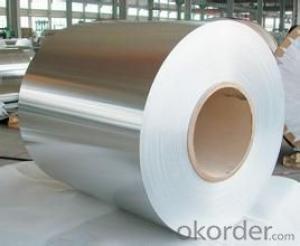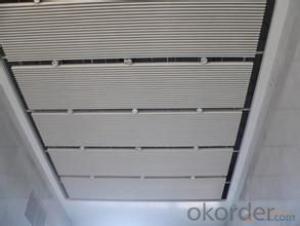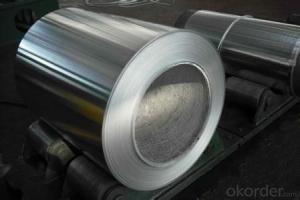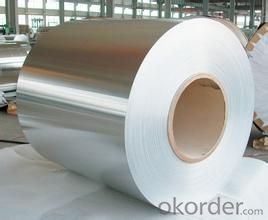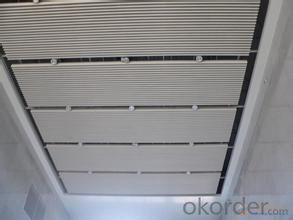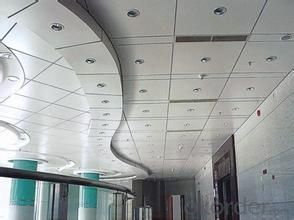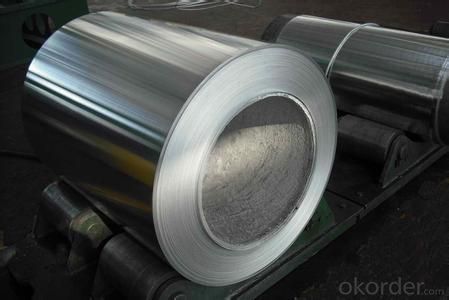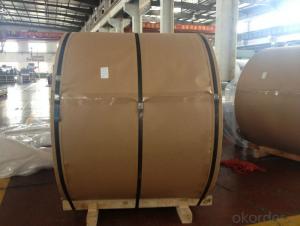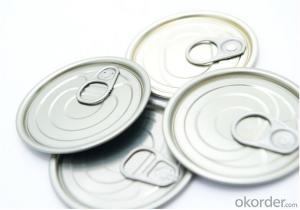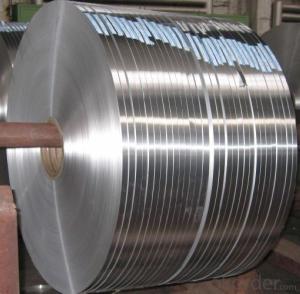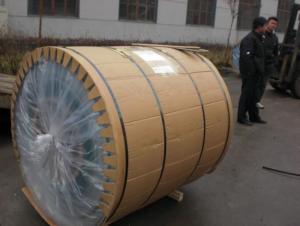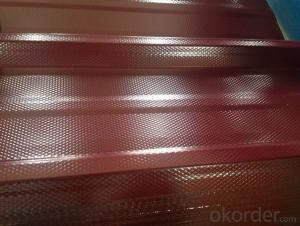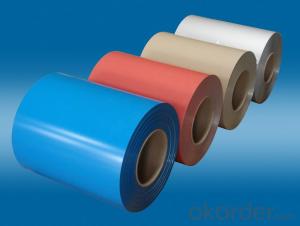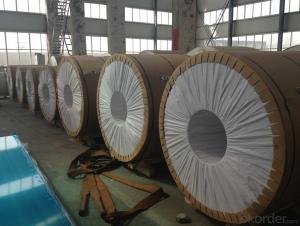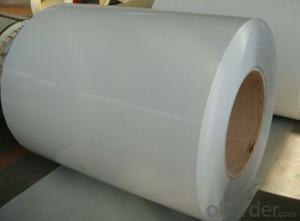Thin Aluminum Coil for Roofing
- Loading Port:
- China Main Port
- Payment Terms:
- TT OR LC
- Min Order Qty:
- -
- Supply Capability:
- -
OKorder Service Pledge
OKorder Financial Service
You Might Also Like
Aluminium is a relatively soft, durable, lightweight, ductileand malleablemetalwith appearance ranging from silvery to dull gray, depending on the surfaceroughness. It is nonmagnetic and does not easily ignite. A fresh film ofaluminium serves as a good reflector (approximately 92%) of visible lightand an excellent reflector (as much as 98%) of medium and far infraredradiation. The yield strength of pure aluminium is 7–11 MPa,while aluminium alloys have yield strengths ranging from200 MPa to 600 MPa. Aluminium has about one-third the densityand stiffness of steel. It is easily machined,cast, drawn and extruded.
Aluminium alloys (or aluminum alloys; see spellingdifferences) are alloysin which aluminium(Al) is the predominant metal. The typical alloying elements are copper, magnesium,manganese,silicon,tin and zinc. There are twoprincipal classifications, namely casting alloys and wrought alloys, both of which are furthersubdivided into the categories heat-treatableand non-heat-treatable. About 85% of aluminium is used for wrought products,for example rolled plate, foils and extrusions.Cast aluminium alloys yield cost-effective products due to the low meltingpoint, although they generally have lower tensile strengthsthan wrought alloys. The most important cast aluminium alloy system is Al–Si,where the high levels of silicon (4.0–13%) contribute to give good castingcharacteristics. Aluminium alloys are widely used in engineering structures andcomponents where light weight or corrosion resistance is required
Specification:
Alloy: AA1050, 1060, 1100,AA3003, 3005, 3015, 5052, 5754, 5083,8011, etc
Temper:H14/16/18/22/24/32, HO etc.
Thickness:0.2mm—100mm
Width: 100mm—2300mm (Can be slitted)
InnerDiameter: 508MM
Coil Weight:500kg-3000kg(Max.)
Application:Foil stock, Circles, Roofing, Can stock, Marine plate,Anti-slipery purpose in vehicles, packing and appliance.
Features:
1. Excellent quality of products
2. Quick delivery
3. Best service to clients
4. BV,SGS avalible
5. No buckle o waveness
6. Tension leveling
7. Certificate of Origin
8. Form A,E
Packaging Detail:
Carton ,Woodenpallet with plastic protection packing ,standard seaworthy packing or as yourrequest.
ProductionCapacity:
AnnualProduction capacity of 600,000 tons.
Products areexported to United States, Canada, U.A.E, Brazil, Mexico,Thailand, Vietnam,Nigeria etc, over 100 countries andregions all over the world.
Production Line:
CNBM aluminumproduction base is comprised of 18 aluminumannealers, 10 coil and foilmills, 4 continuous production lines, 2hot rolling production line and 3prepainted lines.
FAQ:
1. What is the form of payment?
Normally 30% TT, L/C
2. Type of quotation?
FOB, CFR, CIF
3. Port of loading?
Shanghai port
4. Delivery time?
30 day after client’s deposit
- Q: Can aluminum coils be used in the production of household appliances?
- Yes, aluminum coils can be used in the production of household appliances. Aluminum is a lightweight and durable material that has excellent thermal conductivity, making it ideal for applications in appliances such as refrigerators, air conditioners, and heat pumps. Aluminum coils are commonly used in the condenser and evaporator coils of these appliances, where they help transfer heat efficiently. Additionally, aluminum coils are resistant to corrosion, which is important for ensuring the longevity and performance of household appliances. Overall, aluminum coils are a popular choice in the production of household appliances due to their properties and benefits.
- Q: aluminum welding
- You can't. you need a TIG welder to weld aluminum. It's an especially hot welder for aluminum specifically.
- Q: You guys may be thinking, why the hell i posted this in the computer section. Well, I'm opening my computer, and I hate the anti-static wristbands. I know that by touching metal, you can get rid of all static electricity in your hands. Can you do this by touching aluminum foil? Since it's something everyone should have in their house.. Can it work like this?
- Get rid of it... no, but it can shield electronics from it. Only a ground can get rid of static electricity.
- Q: Is it safe and effective to use an electric stove to heat an aluminum coil?
- <p>Yes, you can use an electric stove to heat an aluminum coil. Aluminum is a good conductor of heat, so it will heat up when placed on an electric stove. However, it's important to ensure the coil is clean and free of any non-stick coatings that could be damaged by high heat. Also, be cautious of the temperature settings on your stove, as aluminum can melt at high temperatures. Always monitor the coil to prevent overheating or fire hazards.</p>
- Q: This question asks for an explanation of the various types of coatings that can be applied to aluminum coils.
- <p>Aluminum coils can be coated with several types of materials to enhance their properties for various applications. The main types include: 1. Anodized Coatings: These provide a protective oxide layer on the aluminum surface, enhancing corrosion resistance. 2. PVDF (Polyvinylidene Fluoride) Coatings: Known for their durability and resistance to UV rays, chemicals, and weathering. 3. Polyester Coatings: These are used for general-purpose applications due to their balance of properties like formability and chemical resistance. 4. PVF2 (Polyvinylidene Fluoride) Coatings: Similar to PVDF but with a thinner film, offering good weather resistance. 5. Acrylic Coatings: Known for their flexibility and adhesion, suitable for both interior and exterior applications. 6. Silane Coatings: Provide a thin, protective layer that enhances paint adhesion and corrosion resistance. Each type serves different purposes, and the choice depends on the specific requirements of the application.</p>
- Q: This question asks about the current market demand for aluminum coil, which is a versatile material used in various industries.
- <p>The market demand for aluminum coil is significant and growing due to its wide range of applications across industries such as construction, automotive, aerospace, packaging, and electronics. Its lightweight, corrosion resistance, and recyclability make it a preferred material for many applications. The demand is influenced by economic growth, technological advancements, and sustainability initiatives. As countries focus on greener construction and manufacturing processes, the demand for aluminum coil is expected to increase further.</p>
- Q: How do aluminum coils compare to copper coils in terms of performance?
- Aluminum coils and copper coils serve as two commonly used types of heat exchanger coils within heating, ventilation, and air conditioning (HVAC) systems. Although both materials effectively transfer heat, they differ in terms of performance. Due to its superior heat transfer properties, copper coils have long been the favored option for HVAC systems. Copper possesses excellent heat conductivity, enabling efficient thermal energy transfer. Consequently, copper coils effectively cool or heat the surrounding air, resulting in quicker and more efficient temperature control. Conversely, aluminum coils exhibit lower heat transfer efficiency compared to copper coils. Aluminum proves to be a poorer heat conductor, necessitating a larger surface area to achieve the same level of heat transfer as copper. Consequently, aluminum coils tend to be larger in size to compensate for their inferior heat transfer capabilities. However, aluminum coils possess certain advantages over copper coils. Firstly, aluminum boasts a lightweight nature, facilitating easier handling and installation. This proves particularly beneficial in situations where weight restrictions or handling limitations are present. Secondly, aluminum coils display greater resistance to corrosion in comparison to copper coils. Copper is susceptible to corrosion over time, especially in environments with high humidity or exposure to specific chemicals. In contrast, aluminum naturally forms a protective oxide layer, which aids in corrosion prevention. This results in longer-lasting coils and a reduced likelihood of refrigerant leaks. In conclusion, while copper coils offer superior heat transfer capabilities, aluminum coils possess their own benefits, such as lighter weight and enhanced corrosion resistance. Ultimately, the choice between aluminum and copper coils depends on the specific requirements of the HVAC system, including desired performance, budget, and environmental factors.
- Q: If the aluminum coil is 220 kg, 0.3 thick and 500 wide, how much is the coil diameter?
- With the outer diameter and inner diameter, you can know the volume. With the density and volume, we can calculate the weight. And with weight, we can know the length.
- Q: I'm trying to cast aluminum using plaster and i was wondering if any one know how much the plaster has to be baked and how to tell if the plaster is dried fully and ways to do it. thx
- When okorder /... Aluminum melts at about 1200 F. Silver at about 1700 F. So this would work fine. You would need a Kiln to heat the investment up to these temps - in a pinch a ceramic kiln would work. If you don't get all the moisture out the mold could explode from steam pressure - be careful - read some books or visit some backyard casting sites. Aluminum is also cast using sand casting techniques.Good luck.
- Q: Aluminum is soft, so I have a roll coating, the material is very soft, 0.7*970, into 2100, it can be processed
- The plate: cold rolled hot-rolled plate hot rolling plate, color steel plate roll roll coating color coated plateThe coating: hot galvanized coil electro galvanized coil heat tinplate tinplate chrome plate roll roll roll plastic composite steel plate other coated steel tinplate volume
Send your message to us
Thin Aluminum Coil for Roofing
- Loading Port:
- China Main Port
- Payment Terms:
- TT OR LC
- Min Order Qty:
- -
- Supply Capability:
- -
OKorder Service Pledge
OKorder Financial Service
Similar products
Hot products
Hot Searches
Related keywords
